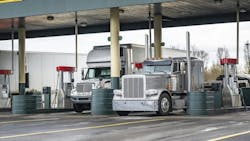Akin: Universal discounts vs. brand-specific rebates: What’s best for your fleet?
Key takeaways:
- Brand-specific rebates can create inefficiencies and increase costs for fleet operators.
- Universal discounts provide consistent savings and flexibility at numerous fuel stations.
- When selecting a program, evaluate the network, discount structure, and transparency for improved fleet efficiency.
Brand-specific rebates may seem attractive on paper, but they often limit flexibility and create hidden costs for fleet operators. Today, modern fuel card providers offer universal discounts that unlock broader savings potential, maximize route efficiency, and give fleet managers the control they need to reduce costs and optimize operations.
The problem with brand-specific rebates
Traditional fuel card programs often offer rebates tied to specific fuel brands or locations. While the advertised discount—such as 5 to 10 cents per gallon—might sound compelling, the reality is often less impressive. Drivers are forced to deviate from optimal routes or waste time searching for approved stations, creating operational inefficiencies that quietly eat into margins.
Some of the downsides of brand-specific rebates include:
- Reduced station availability: Drivers may need to bypass closer or cheaper fuel stations.
- Route inefficiencies: Searching for specific brands can lead to longer driving times and unnecessary detours.
- Variable fuel pricing: Discounts may not apply at stations with already higher-than-average prices.
- Loss of control: Fleet managers have limited visibility over real-time fuel options across a broad network.
The cost of chasing brand rebates
Let’s break down the impact. A fleet with 100 vehicles making two fuel stops per week could waste 20 minutes per stop if drivers have to locate a brand-specific station. That’s over 3,000 lost driver hours annually. At a $25/hour labor rate, the hidden cost exceeds $75,000 per year—not counting fuel inefficiencies.
Similarly, if a driver skips a nearby station with fuel at $3.70/gallon to reach a “discounted” brand station at $3.80 (with a 5-cent rebate), the net cost per gallon is still higher—$3.75. Across thousands of gallons, that adds up fast.
See also: Rising diesel and gas prices: What you need to know
Why universal discounts unlock better savings
Universal discount programs—like those offered by modern providers such as RoadFlex—deliver flat discounts across most fuel stations nationwide. This provides flexibility and lets drivers fuel wherever it makes sense without sacrificing savings.
Key benefits of universal discounts:
- Broader network access: Discounts apply at 95%+ of fuel stations.
- Route optimization: Drivers can fuel at the most convenient stop.
- Consistent savings: A simple, flat rate discount makes cost management predictable.
- Faster adoption: It is easier to roll out across large teams with fewer restrictions.
Case study: A regional delivery fleet
One delivery company operating in the Southwest switched from a brand-rebate program to a universal discount card. The change reduced average fuel costs by 8 cents per gallon and saved drivers 15–20 minutes per day. In just six months, they saved over $42,000 in fuel and labor efficiencies—without changing the size of their fleet.
How to choose the right program
When evaluating fleet card options, consider the following:
- Network breadth: Can your drivers use the card at any station?
- Discount structure: Is the discount fixed and universal, or conditional on location or brand?
- Technology stack: Does the platform offer route optimization, spend controls, and real-time insights?
- Transparency: Are all fees, rebates, and terms clearly disclosed?
Final takeaway
Fleet fuel programs shouldn’t be a game of navigating brand restrictions or decoding rebate conditions. Universal discounts simplify operations, empower your team, and drive real savings without compromise. Providers like RoadFlex are leading the way with flexible, tech-forward solutions that align with modern fleet needs so your drivers spend less time searching and more time delivering.
About the Author

Rush Akin
Rush is an experienced veteran in the fleet industry, with over 20 years of experience in fleet management. Before joining RoadFlex, Rush served as the SVP of sales for Solera, where he was in charge of overseeing fleet sales and business development in North America. Prior to Solera, Rush worked with well-known brands in the industry, such as Rand McNally, Lytx, FourKytes, and Syntech Systems Fuel Master. Rush has a strong background in fleet and fuel management, as well as customer success.
